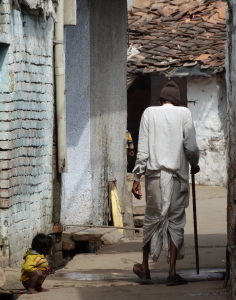A Boon or Curse? Status of the Elderly in Rural India
Praveen Aivalli presents some reflections about the neglected status of the elderly in India, and the need for an organised health system response to tackle this issue.

A hundred and two year old man lying helpless in the corner of a house like an animal raised a question in my mind about the situation of Indian elderly in rural India. I came across this old man at a village of south Indian state Karnataka. The man was once the head of the family, and its sole breadwinner, and today he lies in a corner of the house, abandoned by his family. A man who had built this house, provided for his children, played his role in society and perhaps never imagined that he will be spending his last days in a cow shed he made, just waiting the end.
I visited his village as part of a research team collecting data on access to medicines for rural poor. While I was talking with his family members, he turned his head towards me and waved his hand. Out of interest I went inside the room to see his condition. He only noticed my presence through my voice; I saw that he was feeling things around him with his hands, and continued waving his hands in my direction. I was unable to understand his gestures. I peered closely only to notice his glazed eye caused by hyper-mature cataract; I wondered how long he had been blind. I couldn’t talk to him as he was unable to hear me and I was unable to understand his expressions, but one thing I heard very clearly “maatrekodi” (“give me medicine” in Kannada, the local language). He was asking me for the tablets for his body ache.
When I asked his family members why they have left him in such a pathetic condition, his son replied “We are poor and we are unable to manage our own lives. How can we take care of him? His medical expenses are high? He does not earn any more. He has lived a long life, he has done all the things whatever he wanted to do in his life. There is no benefit from him, we don’t get any help from government too for him. We are helpless”. I came to know from the family members that he was paralyzed and lying in this condition for the past two years!
His son narrated the efforts he had put in to improve his father’s condition. They visited the nearby government primary health centre (PHC) many times and most of the time, the doctor gave some medicines and charged money for them, the son said. Despite these multiple visits his condition did not improve. When his condition worsened, they visited the PHC again and were told such patients cannot be managed at the PHC, and that they did not have sufficient medicines to give. The doctor there asked him to go to the taluka hospital (sub-district hospital) and get treated there.
As per doctors advice they took him to the taluka hospital, 14km away from their village. They registered his name in out-patient counter and consulted the physician. The physician in the taluka hospital assured the family that the medicines should be available in the nearby PHC. The old man and his son were happy and came back to village, but the medicines were often not available at the local PHC. And the son could not sustain constant loss of wages from taking his father to higher hospitals for treatment. Neither could he afford to buy the medicines at one of the many private pharmacies. I had nothing to say; on one hand, the son’s failed attempts to obtain medicines from the nearest PHC and on the other the family’s indifference towards its elderly. I silently walked away thinking about the societal attitudes towards elderly, but also about the health system’s responsibility for their health and well-being.
This is not an isolated experience. We came across many similar instances in the course of our data collection. Many of our elderly suffer from high blood pressure or diabetes and often do not even know of this, and many of them do not take any medication for these conditions. Many of them may not even be getting three square meals a day.
The number of elderly in India is growing with the improvement in life expectancy. The problems of the elderly are primarily economic, marked by the loss of independent income. One can’t reverse the aging process; disability and diseases are part of old age, but it doesn’t necessarily mean that we have to treat them badly. With the changing family structure from interdependent joint families to independent nuclear families, our elders do not lead a safe, secure and dignified life. While the families fail them on one side, the social security schemes for elderly are very limited in India. And it turns out that the health system too is not sensitive to their needs.
Health and well-being of the elderly has not become priority of our health system. The rights of an elderly citizen should be clearer. Introduction of new policies and programmes to enhance skills and knowledge in geriatric care are required. Strengthening the existing health services and sensitizing charitable trusts and non-governmental organizations could go a long way in addressing the geriatric issues especially for rural communities. In a country where there is supposed to be a long tradition of respecting the elders (MathaPitha Guru Daivam – an ancient Sanskrit hymn comparing parents and teachers to God), it is a pity that health services and social security systems for the elderly are failing badly.
 Dr.Praveenkumar Aivalli M.P.H, is a public health researcher at Institute of Public Health, Bangalore India. He is currently working on W.H.O Alliance project “Access to medicines”.
Dr.Praveenkumar Aivalli M.P.H, is a public health researcher at Institute of Public Health, Bangalore India. He is currently working on W.H.O Alliance project “Access to medicines”.

This is reflective of the general situation of drug availability in India. Tamilnadu state is lot better because of its centralised drug intending body which is being show cased as a model for the rest of the country. Kerala, the place where I work is little better but continued drug availability is a problem. Recently there was rampant corruption in the drug procurement body in the state with excess purchasing of some costly drug which could not be used!